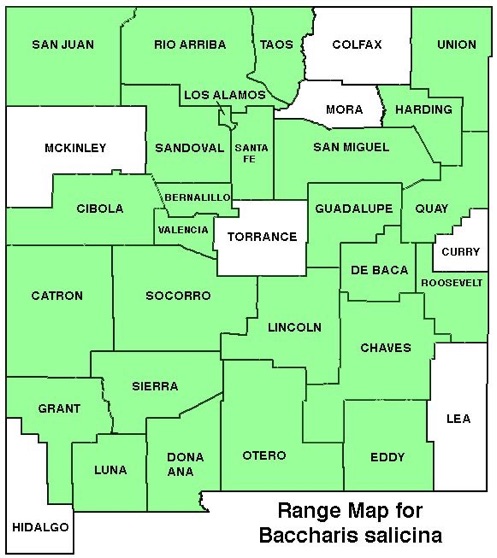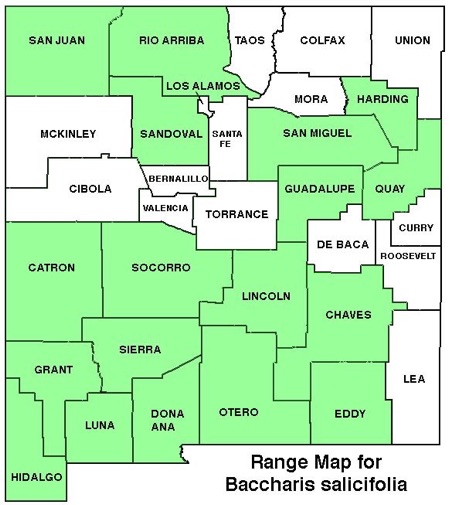WILDFLOWERS OF NEW MEXICO

This 3–6 feet tall, woody shrub has numerous erect, leafy branches covered with willow-like leaves. Dense clusters of white, pompom-like flower heads cover the branch tips. Note the narrow leaves with or without scattered teeth, hairless stems, flower heads without rays (petals). The plant favors moist habitats. Flora of North America considers this species a complex of four intergrading species that vary from broad leaves and larger heads to narrow leaves and smaller heads.
FLOWER: April–October. Flower heads with white to cream-colored disk florets (no rays); phyllaries (bracts) cupping the florets are gland-dotted, with green to reddish midribs and green to purplish tips. In fruit, the flower head is packed with silky-white to tawny pappus (bristle-like hairs) 5/16–1/2 inch long (8–12 mm). Male and female flowers are on separate plants.
LEAVES: Alternate with short stem (petiole). Blades oblong to lance-shaped, 3/8–3 1/2 inches long (1–9 cm); lower leaves have 1–3 pairs of coarse teeth toward the tip, upper leaves narrower, margins often entire; surfaces hairless, gland-dotted.
HABITAT: Sandy, gravelly, coarse moist soils; stream banks, arroyos, seeps, flood plains, disturbed areas; riparian, pinyon-juniper, oak-ponderosa woodlands.
ELEVATION: 3,400–7,400 feet.
RANGE: AZ, CA, CO, KA, OK, NM, NV, TX, UT.
SIMILAR SPECIES: The nearly identical Seep-willow, B. salicifolia, (see photos below) in much the same habitat and range, has narrow, sessile (no stem) leaves with finely serrated margins, and pappus only 1/8–1/4 inch long range (3–6 mm).
NM COUNTIES: Widespread in NM in low- to mid-elevation, moist soils: Bernalillo, Catron, Chaves, Cibola, Curry, De Baca, Dona Ana, Eddy, Grant, Guadalupe, Harding, Lincoln, Los Alamos, Luna, Otero, Quay, Rio Arriba, Roosevelt, San Juan, San Miguel, Sandoval, Santa Fe, Sierra, Socorro, Taos, Union, Valencia.









WILLOW BACCHARIS
BACCHARIA SALICINA
Aster family, Asteraceae
Deciduous shrub









THE CONTENTS OF THIS WEBSITE ARE COPYRIGHTED AND CANNOT BE USED
WITHOUT PERMISSION OF GEORGE OXFORD MILLER
















EMAIL ME




































• Phyllaries beneath the florets have green to reddish midribs (left arrow).
• The pappus bristles are creamy to tawny and up to 1/2 inch long (right arrow).


-
•Leaves are willow-like with or without a few coarse teeth near the tip (upper arrow),
and a short stem (petiole) (lower arrow).
-
•The shrub typically reaches 3–6 feet tall with upright stems (right photo).

SIMILAR SPECIES
Seep-willow, Baccharis salicifolia


















Seep-willow has shorter, whiter pappus (arrow).
Nectar-rich flowers attract many pollinators.



















Leaves are narrow with small, widely-spaced teeth along the margins (lower arrow), and with short stalks or sessile (no stem) (upper arrow).










